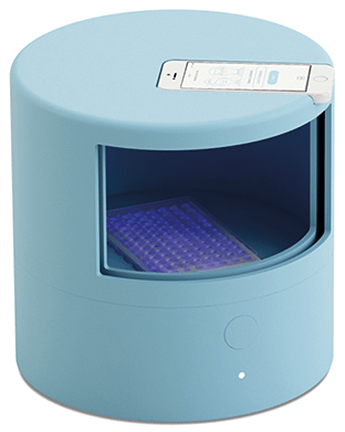A start-up company called Miroculus (www.miroculus.com) is developing a microRNA detection platform (Miriam) that could potentially detect dozens of different diseases using just one milliliter of blood. MicroRNA molecules – whose number vary depending on both internal and environmental conditions – regulate the expression of genes in cells. Given enough data linking microRNA signatures to disease states, the platform could potentially give clues about a person’s health – long before symptoms appear.
“Traditionally, medical intervention has focused on the treatment part of disease and not so much on prevention,” says Jorge Soto, CTO and co-founder of Miroculus. “Early cancer detection tests are something that other research groups have tried, but in our case we have decentralized the lab using the cloud, which dramatically reduces costs.” The Miroculus and its Miriam platform, which span out of Singularity University (singularityu.org), have certainly captured the attention of the popular media; Soto’s TED talk has garnered nearly half a million views in just two months (online: tas.txp.to/1214/TED). “One in three people sitting in this audience will be diagnosed with some type of cancer, and one out of four will die because of it,” Soto told the quickly attentive live TED audience.

At the core of the platform is a special 96-well plate that has been pre-treated with patented biochemistry to “trap” specific microRNA. After the plate is inserted into the reaction device, a smartphone records images and sends them to a cloud database, which identifies patterns that may be associated with disease. “Specific patterns of expression (or not) of microRNAs correlate to specific diseases, particularly cancer, but also other metabolic and psychiatric diseases,” explains Soto. “With this platform we are not directly looking for specific types of cancer; we are looking for the microRNAs circulating in blood.” The problem? MicroRNAs are short in length and not highly differentiated. Nevertheless, Soto claims the developing (but somewhat mysterious) technology is up to the task, and says that the partially 3D-printed prototype has been able identify microRNA patterns of pancreatic, lung, breast, and hepatic cancers. It’s early days and a huge amount of data will be needed before the platform can be marketed as a diagnostic tool. In the meantime, the company will be targeting the pharmaceutical industry as potential users of the device because it could provide important information about how patients react to new drugs – and allow Miroculus to obtain more robust microRNA-related data.
